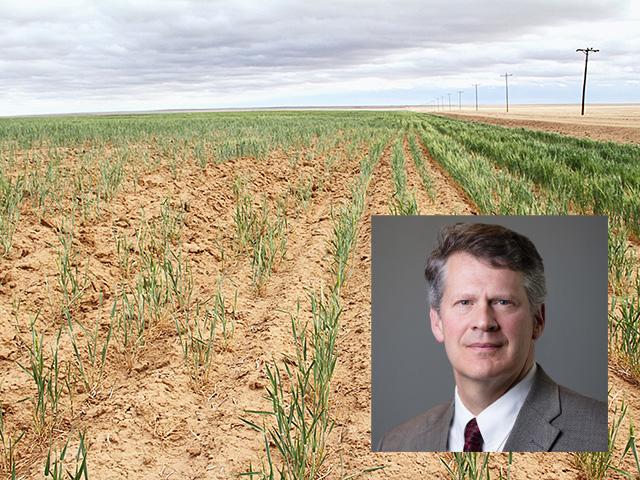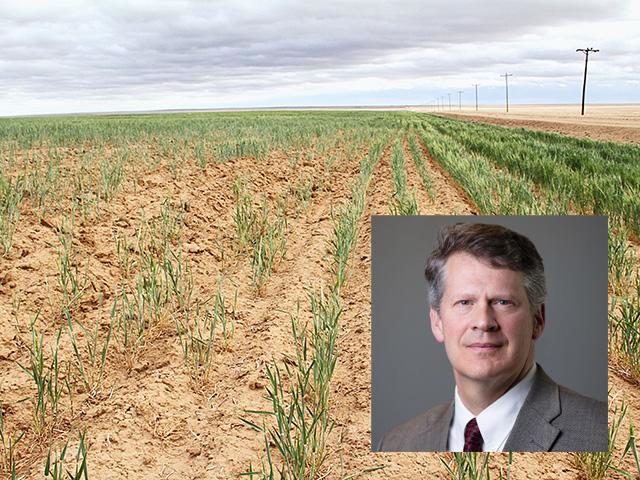Ag Policy Blog
AFT: Non-irrigated Agriculture Faces Greater Climate Threats
"Unless society intervenes, food security will increasingly be at risk."
That's the take from a new report by the American Farmland Trust looking at climate impacts on growing conditions for non-irrigated agriculture in the U.S.
With roughly 80% of agriculture relying on reliable rainfall to produce a crop, non-irrigated agriculture will face greater challenges in a warmer climate with shifting rain patterns, AFT cites. Projected yield losses will cross with the need to increase food production to meet a growing population globally.
Some of the AFT reporting findings:
-Under scenarios with higher emissions, only 33% of corn acres would remain highly productive with current corn varieties.
-Only 47% of wheat acres will be likely to support the winter wheat varieties currently grown.
-Only 4% of the current commercial apple production acreage will be likely to support the current apple varieties grown.
The report specifically looked at areas with high reliance on rainfall, so states with higher percentages of irrigated cropland were no included in the report. AFT cited that only 14% of cropland right now is irrigated, but it accounts for more than 54% of total U.S. crop sales, including more than 70% of vegetables, and 80% of fruits and nuts.
States with a high proportion of irrigated cropland include California (73%), Nevada (61%), Wyoming (55%), Idaho (51%), Utah (48%), Nebraska (46%), and Arizona (45%).
P[L1] D[0x0] M[300x250] OOP[F] ADUNIT[] T[]
Those states and other areas with higher percentages of irrigation will face more pressure in future years as more water basins face increased stress due to declining supplies and increasing demands.
AFT's report echoes themes from last month's warning from the United National Intergovernmental Panel on Climate Change, as well as a report release last fall from Environmental Defense Fund that looked at corn, soybean and wheat yields in the Midwest.
While groups keep sounding alarms about risks to the food supply, John Piotti, president of American Farmland Trust, said he doesn't think the issues around climate change and food security are getting the attention they deserve from policymakers.
"The passage of the IRA (Inflation Reduction Act) was a major change, in that it was a recognition within the minds of some policymakers that we needed to take major steps with agriculture to help combat climate change," Piotti said. "I think that was a that wouldn't have happened several years ago, there were very few members of Congress, very few policymakers who really saw agriculture as part of the solution here. So I think we have seen forward momentum, maybe even significant, forward strides, but the urgency is so great, that that we need, we need even more."
With nearly $20 billion in the IRA for USDA conservation programs to reduce emissions or sequester carbon, Piotti said conservation has gone from being considered "non-political and fairly non-partisan," to "now getting wrapped up in deeper political issues."
He added, "So there's, there has been movement, but a lot of that movement has been on one side of the aisle, and it's creating divisions. So that's a challenge. And then the other challenge is the movement isn't enough, given, given the pressures and the urgency."
That leads into talk about the 2023 farm bill, and debate about whether the conservation programs see money shifted away to fund commodity programs or other farm bill titles. AFT wants Congress to protect the conservation title, arguing that those programs are fundamental to protecting the ability to farm and build resiliency going forward.
"We have all these programs that work. They are both important on the climate mitigation and the climate adaptation side," Piotti said. "Conservation practices have been shown now -- we've had decades of experimenting with them -- and I think we worked out a lot of the bugs, and many of them work really well. The challenge is getting them to scale. And we finally, we finally are in a position with the infusion of funding."
He added, "So the real goal in our mind is to maintain the strength of the conservation programs that are entitled to by making sure they are adequately funded. And in our mind, that means both the traditional farm bill and the new funds in the IRA."
While stressing the importance of conservation programs going forward, Piotti said AFT still supports ensuring that those practices are voluntary and remain incentives rather than requirements to participate in crop insurance or commodity programs.
"We would love to see more farmers take advantage of these programs, but farmers have enough burdens on themselves. We're hesitant about too many requirements."
AFT's report cite that farmers and ranchers face adaptation challenges regardless of actions taken to reduce GHG emissions farther in the future. The differences between continuing the status quo and taking immediate climate action today become clearer after 2050. The report cites the need for USDA "to provide enough technical and financial assistance to achieve the scale of landscape resiliency needed." The report added, "Even after years of aggressive outreach, farmers on 95% of U.S. croplands still do not plant cover crops."
AFT's report on climate ties into its report last year on loss of farm ground, which highlighted that agriculture is losing roughly 2,000 acres of farmland or ranchland every day, largely to urban sprawl. Piotti noted there remains a disconnect between people who stress better farming practices and changing land use with the loss of agricultural land. This is a policy problem the drills down to the local level.
"They're still not recognizing the fact that if we lose more farmland, we're losing two things that are critical one, we're losing land that could be managed for better practices to provide environmental benefits. And then secondly, we're putting more pressure on the remaining land to be farmed more intensely, which is going to make it even harder for that land to have environmental benefits," Piotti said. "So it becomes sort of a reinforcing downward spiral. And I, I really don't think that a lot of members of the environmental or conservation community, completely get those, how those two points are connected, the land and practices are intimately connected in a way that I don't think people who should know better."
American Farmland Trust report
Chris Clayton can be reached at Chris.Clayton@dtn.com
Follow him on Twitter @ChrisClaytonDTN
(c) Copyright 2023 DTN, LLC. All rights reserved.





Comments
To comment, please Log In or Join our Community .